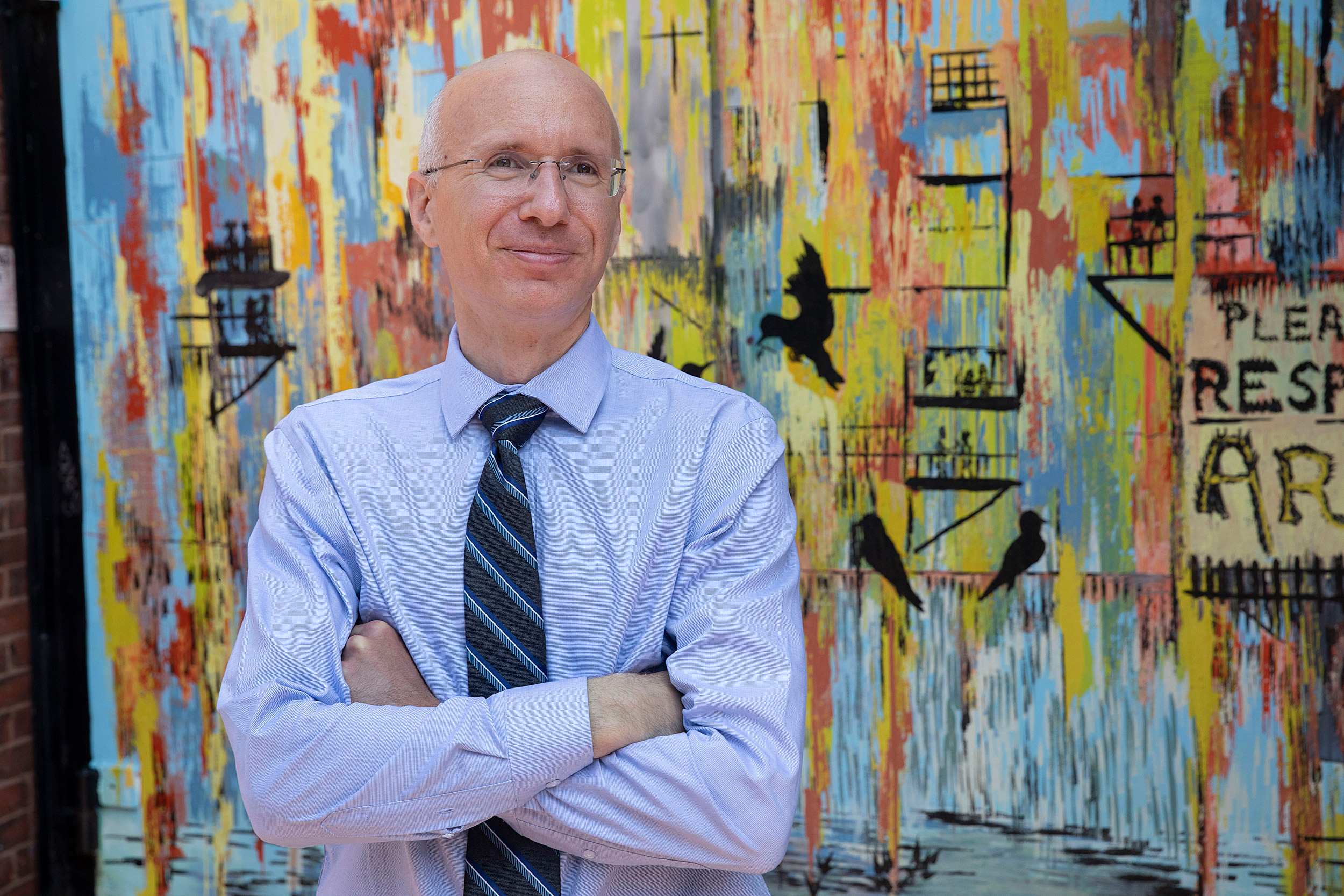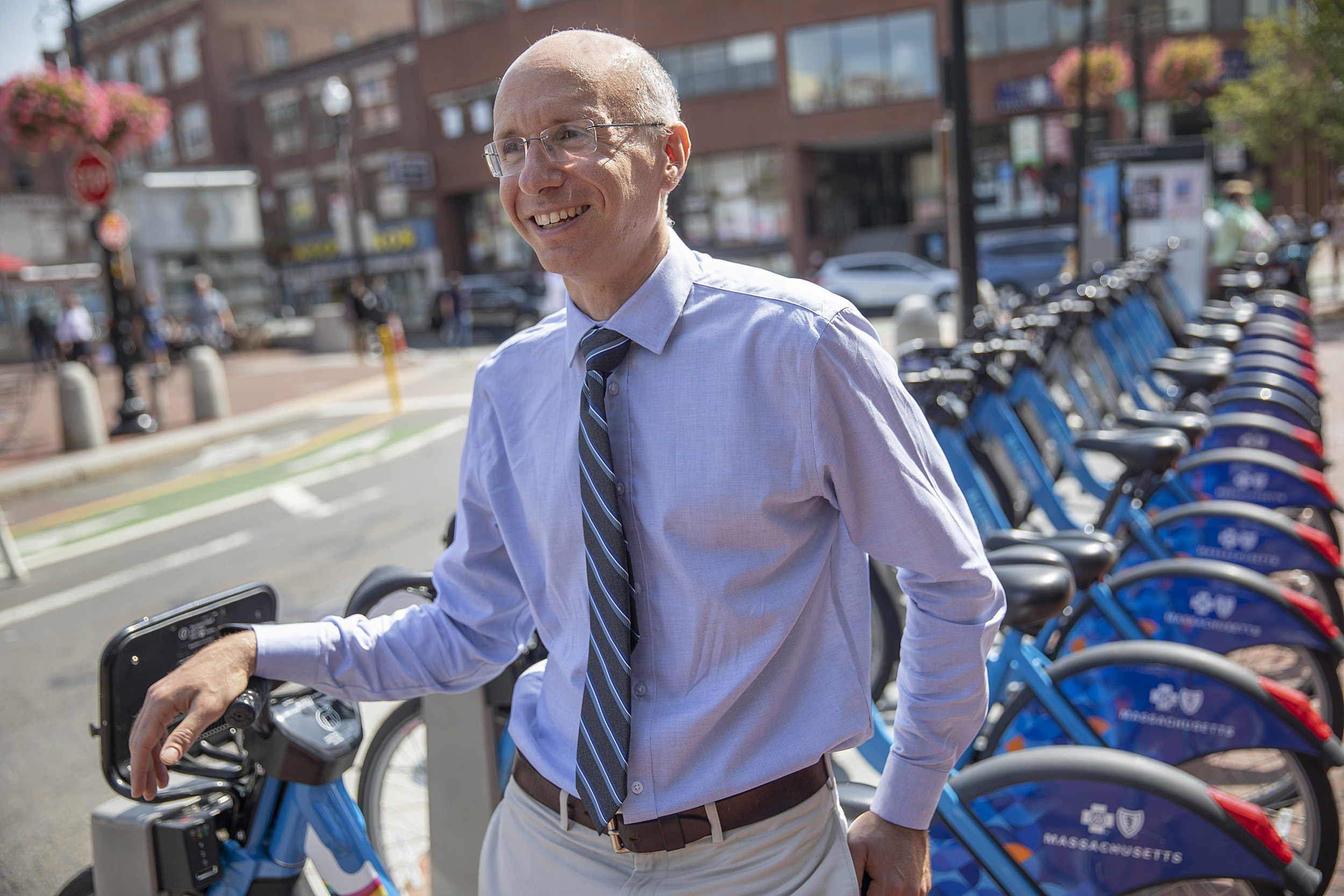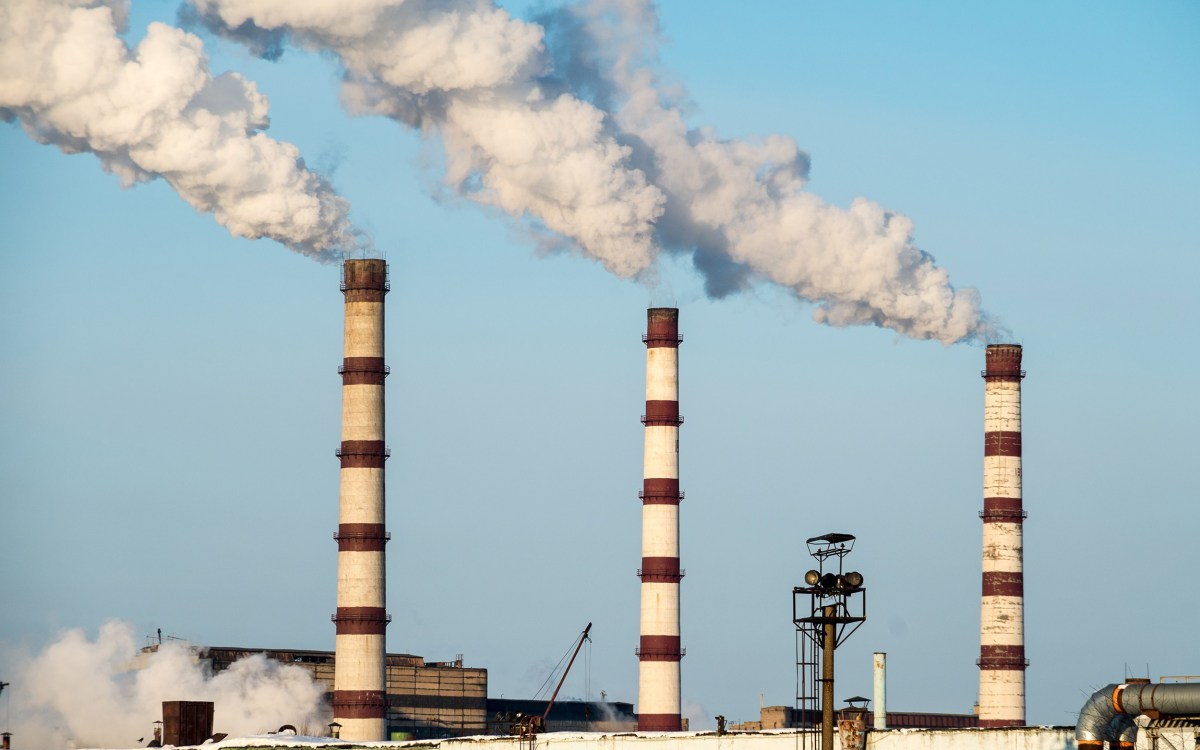
Aaron Bernstein describes the potential health consequences of climate change on children.
Kris Snibbe/Harvard Staff Photographer
On climate, the young take the lead
In Q&A, Harvard pediatrician outlines upcoming global strikes, the rise in youth protests, and the concern over their health
As part of its coverage of Climate Week (Sept. 23-29), the Gazette is running a series of stories on the issues involved, while spotlighting areas of University involvement, including research and programs designed to make a difference. For more information, visit the Tackling Climate Change site.
Global one-day strikes, driven by young people demanding action against climate change, are planned for Sept. 20 and 27, sandwiched around a meeting next week of world leaders on the issue at the United Nations. The protests grew out of 15-year-old Greta Thunberg’s strike last year outside the Swedish Parliament, during which she demanded climate action. The protest caused her to miss classes, which led to strikes by other students, and now to the global protests.
To understand better the issues in play and the particular dangers that climate change poses for the world’s children, the Gazette spoke with Aaron Bernstein, co-director of the Harvard Chan School’s Center for Climate, Health and the Global Environment and a pediatrician at Boston Children’s Hospital.
Q&A
Aaron Bernstein
Gazette: Global climate strikes, driven by youth, are planned for the next week. Do you see them as a good thing or a bad thing?
Bernstein: The strikes make clear that our children recognize, perhaps more than us adults in the world, what’s at stake with climate change. They are going so far as to walk out of class to make us realize how much they care about this.
Gazette: Adults often dismiss the protests of children because they’re seen as inexperienced and don’t understand the world. But in this case should we listen to them?
Bernstein: Who has more at stake than the people on the planet who have the longest lifespans ahead of them? It may not be surprising that our children are leading on this because they’ve been educated on the subject, and many, perhaps most, adults have not. In many ways, they may understand what’s at stake for everybody, including themselves, more than the adults in the room. So there’s a compelling reason to listen to what they’re telling us about what needs to be done.
Gazette: Your area of expertise is children’s health and climate. What’s at stake for them with regards to health?
Bernstein: Climate change comes mostly from burning fossil fuels, and burning fossil fuels poses harms to children. Air pollution from the burning of fossil fuels can damage their developing lungs and brains. Children may have lifelong health impacts from the trauma that can come with extreme weather events, like hurricanes and wildfires.
On the flip side, if we fight climate change and reduce reliance on fossil fuels, we can combat a host of childhood health problems such as obesity — arguably the single biggest threat to our children’s health today — because we’ll also have better air quality, better public transit, and more kids walking and biking. So, our fight to combat climate change is a fight for our children’s health, and when we succeed, we will have achieved an enormous health victory for our children. And what could be better than that?
Gazette: What about changing patterns of disease? Will warming also bring pests and infectious disease further north?
Bernstein: There’s reason to be concerned about warming and how rainfall events are becoming heavier, and what these mean for where insects that transmit disease might want to live. There’s evidence that ticks that transmit Lyme disease are moving northward into upper parts of New England, for instance. There’s some evidence that eastern equine encephalitis may be moving northward. We need to understand a lot more about how our changing climate may influence these diseases to keep people, and especially children, healthy.

Aaron Bernstein
Kris Snibbe/Harvard Staff Photographer
What’s clear to me, though, about climate change and infections, whether we’re talking about dengue moving into the United States or other vector-borne diseases moving into New England, is that our job at controlling them doesn’t get easier as the rules of the game that govern where insects live change.
Gazette: We’re essentially giving these diseases a boost?
Bernstein: In places like New England, yes. In other places, where it may be too hot, we’re probably making it harder for them. Even if we don’t know precisely where and when climate change may be causing disease risk to wax or wane, one thing is for sure: We are setting ourselves up for unwelcome infectious disease surprises, and nobody I know likes those.
Gazette: You testified on these issues before Congress this year. What was your reception?
Bernstein: The pleasant surprise was that no one in that room — and there were people on both sides of the aisle — was debating the reality that humans are driving climate change. That was not the conversation. The conversation we did have is an important one. It was about how can we transition away from fossil fuels responsibly. There were representatives in that room who were from coal country in Kentucky, from fracking country in Ohio, and oil country in Louisiana. There were also people from California, Massachusetts, and New York, where that’s not the case.
As we figure out how to prevent carbon pollution, it’s not fair to simply say “we’re going to do this,” and not think about the people who would have little, if any, economic opportunity if not for fossil fuels. We need a plan that includes them, and we’re starting to have that conversation. There’s an equity issue around making a just transition to a carbon-free economy, one that doesn’t bankrupt communities around the country. I think those who argue for decarbonization need to recognize that is part of the equation.
Gazette: When you talk about equity in climate change solutions, are you talking specifically about minority populations, living in less desirable locations, near power plants, things like that?
Bernstein: We know that air pollution that is associated with burning fossil fuels disproportionately affects black and Latino children in the United States. And their families are least responsible for that pollution. If we can reduce that pollution, which comes mostly from burning fossil fuels, they may benefit the most.
Gazette: And when you say they’re “least responsible,” you mean because they use those resources less?
“Who has more at stake than the people on the planet who have the longest lifespans ahead of them? It may not be surprising that our children are leading on this because they’ve been educated on the subject, and many, perhaps most, adults have not.”
Bernstein: That’s right. There’s a publication in the Proceedings of the National Academy of Sciences this year that examined the disproportionate exposure to pollution and asked the further question: “Who’s actually responsible for this pollution in the first place, in terms of consumption?” And African Americans and Latinos in the United States are responsible for substantially less than their fair share. So not only are they overexposed, but they’re not the ones making it.
Gazette: Do you have a favorite policy solution?
Bernstein: I’ve seen several paths forward from people I trust and respect, but regardless of the policy tool, what’s critical to me is that a strong lens gets put on the health and equity implications of whatever actions we take. There are few things more important to think about than the near- and long-term health effects on children, especially children whose health is already compromised.
Gazette: Given intransigence at the federal level, there’s a temptation to be pessimistic on this issue. But it seems there is also a growing groundswell, and the states have continued to do things even absent the federal government. How are you feeling about his issue now?
Bernstein: I don’t have time to be pessimistic. Besides, consider the fact that the states with the highest penetration of wind energy as a percentage of their electricity generation, depending on the year, are places you might not expect: Kansas, Iowa, and Oklahoma. We see more and more cities setting goals that include carbon neutrality, including some of the largest in the world, like New York, Los Angeles, Chicago, and many others. Cities are where most of the carbon pollution is coming from, so that’s an encouraging sign.
We see the rapid development of renewables in other countries, and I think the global economy has seen the writing on the wall, and the wise money is increasingly investing in the technology that will dominate the future global economy and get us off fossil fuels. So there are all kinds of signs that things are moving in the right direction. The question is how fast we can move these things forward. That’s one reason why the health argument is important. If parents and children recognize that their health is in play and that it could be substantially better in a world without fossil fuels, they may be more eager to move forward.
Gazette: What about goals here on campus?
Bernstein: I was on the University Climate Change Task Force, and I think it’s important that we acknowledge that the University’s goal for 2050 went beyond carbon neutrality to fossil-fuel free. The University moved that way out of a recognition that fossil fuels don’t just put out carbon, they put out other forms of pollution that harms people, and that if we want a healthier, more just, and sustainable world, this was the right thing to do.







